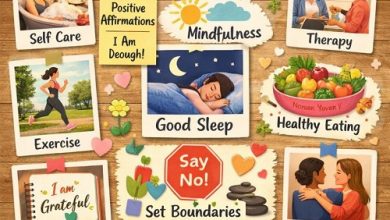This One Mindless Habit Could Be Exposing Your Work Stress — Scientists Explain Why

In today’s fast-paced world, stress has become an almost invisible companion in the workplace. You might not even realize how often it creeps into your daily routine — hidden behind your morning coffee, late-night emails, or endless scrolling through your phone during breaks. But according to new scientific findings, there’s one seemingly harmless habit that could be revealing just how stressed you really are — and it’s something you likely do multiple times a day without thinking.
So, what’s this mindless habit?
Mindless scrolling.
Yes — that constant, automatic checking of your phone, email, or social media feed when you feel tired, anxious, or overwhelmed. Scientists now say that this behavior could be not only exposing your stress but also amplifying it. Let’s explore what the research shows, why it’s happening, and how you can break free from this hidden stress trap.
The Rise of Mindless Scrolling: How It Became a Workplace Norm
Once upon a time, a coffee break or a short walk around the office was enough to reset the brain between tasks. Today, those moments of rest have largely been replaced by digital breaks — quick check-ins on Slack, Instagram, LinkedIn, or the news.
According to a 2024 report by the American Psychological Association (APA), over 78% of employees admit to checking their phones within five minutes of feeling stressed at work. Most don’t even notice when they do it. It’s become a reflex — like breathing.
Psychologists call it “digital self-soothing” — a form of avoidance that tricks the brain into thinking it’s taking a break. But in reality, this habit keeps your stress system switched on.
Dr. Emma Raines, a neuroscientist at Stanford University, explains:
“When you reach for your phone in moments of stress, your brain interprets it as a coping mechanism. But instead of reducing stress hormones, it can actually increase cortisol because you’re never fully disengaging from the source of pressure.”
The Science Behind the Habit: Why We Scroll When We’re Stressed
To understand why this happens, we have to look at the brain’s reward system. When you feel overwhelmed by work — tight deadlines, constant meetings, or difficult clients — your body releases cortisol, the stress hormone. This makes you crave something that feels rewarding or soothing.
Your brain knows that checking your phone, seeing a funny meme, or getting a “like” on your post triggers a small release of dopamine — the feel-good chemical. That brief hit of pleasure counteracts stress for a moment, giving you temporary relief.
But here’s the problem:
That dopamine rush fades fast. Then your brain starts to crave another hit, leading to an endless loop of “stress → scroll → short relief → more stress.”
This cycle is known in psychology as “digital escapism.” And according to multiple studies, it doesn’t relieve stress at all — it just disguises it.
A 2023 study published in Frontiers in Psychology found that employees who frequently used social media during stressful work periods reported higher levels of anxiety and fatigue compared to those who took screen-free breaks.
Your Phone as a Stress Mirror: How It Reveals What’s Really Going On
Scientists have started using smartphone data to analyze stress patterns — and the results are astonishing. Research from the University of California, Irvine, tracked over 2,000 professionals for six months and found that:
- People opened their phones an average of 80 times per day, mostly during moments of mental fatigue or boredom.
- Stress levels (measured through heart rate and cortisol) spiked within 30 seconds of each phone-checking episode.
- Those who used their phones as a coping tool were 40% more likely to report burnout within three months.
In other words, your scrolling habits might be silently broadcasting your stress levels. The more you scroll, the more your body reveals its struggle to cope.
Dr. Raines summarizes it perfectly:
“Your phone doesn’t just record your digital life — it reflects your mental state. Every time you reach for it unconsciously, you’re signaling a stress response.”
Signs You’re Using Mindless Scrolling as a Stress Coping Mechanism
You might not even realize that you’re doing it. But if any of these sound familiar, you’re likely using your phone as a stress outlet:
- You check your phone without purpose.
You open an app, scroll for a few seconds, and realize you’re not sure why you did. - You feel restless when you can’t check your phone.
That subtle itch or discomfort when your phone is out of reach is a sign of stress-based dependence. - You lose track of time while scrolling.
A “quick check” turns into 20 minutes of scrolling — leaving you feeling guilty and more behind on work. - You scroll after a difficult meeting or email.
This is one of the clearest indicators that you’re using digital distraction to cope with tension. - You feel mentally foggy or tired after breaks.
True relaxation restores focus; digital breaks often drain it further.
The Hidden Cost: How This Habit Amplifies Work Stress
At first, scrolling may feel like a harmless way to decompress. But over time, it has a cumulative effect that worsens both mental and physical stress.
1. It Keeps Your Brain in a Constant State of Alert
Each time you check notifications or scroll through updates, your brain experiences a micro-dose of cognitive stimulation. Instead of resting, your mind keeps processing information — emails, headlines, messages. That prevents recovery from stress and contributes to mental fatigue.
2. It Disrupts Your Focus and Productivity
Switching between work tasks and digital distractions creates attention residue, a phenomenon where your brain struggles to refocus. A Harvard Business Review analysis found that employees who frequently checked their phones during work were 29% less productive and twice as likely to feel burned out by the end of the day.
3. It Triggers Negative Comparison
Social media isn’t just a distraction — it’s an emotional trap. Seeing others’ “highlight reels” can unconsciously trigger self-doubt, especially during stressful work periods. This leads to increased feelings of inadequacy and imposter syndrome.
4. It Disrupts Sleep — the Ultimate Stress Regulator
Checking your phone late at night or during work-related anxiety interferes with melatonin production. Poor sleep increases cortisol levels the next day, trapping you in a vicious cycle of stress and fatigue.
What the Experts Recommend: How to Break the Cycle
The good news? You can train your brain to manage stress more effectively without falling into the scrolling trap. Here’s what scientists and psychologists suggest:
1. Name the Trigger
The first step is awareness. Start noticing when and why you reach for your phone.
Is it after an email? A meeting? A moment of boredom?
By identifying the trigger, you can replace the habit with a healthier alternative.
Dr. Jud Brewer, a neuroscientist at Brown University and author of Unwinding Anxiety, explains:
“Once you recognize the loop — trigger, behavior, reward — you gain the power to interrupt it. Awareness is the key to breaking automatic habits.”
2. Replace Scrolling with Micro-Breaks
Instead of checking your phone, try:
- Deep breathing for 60 seconds
- Stretching or walking around the room
- Sipping water or stepping outside for sunlight
These micro-breaks activate the parasympathetic nervous system, helping your body relax and recover naturally.
3. Use “Digital Barriers” to Limit Impulse
Simple tools like screen time limits, app blockers, or even grayscale mode can make your phone less tempting. Set designated “scrolling times” instead of using your phone as a constant pacifier.
4. Create a Phone-Free Zone at Work
Keep your phone out of sight during deep work sessions or meetings. Research shows that even having a phone visible on your desk can reduce concentration by up to 20%.
5. Practice Mindful Transitions
Before and after stressful tasks, take 30 seconds to pause. Close your eyes, take a deep breath, and mentally reset. This helps your brain move between tasks without resorting to digital distraction.
The Power of Mindfulness: Retraining Your Brain for Calm
Mindfulness practices have been shown to reduce workplace stress more effectively than most digital coping mechanisms. In a 2022 meta-analysis by The Journal of Occupational Health Psychology, mindfulness meditation was linked to:
- 33% reduction in perceived stress
- 20% increase in focus
- Significant improvement in emotional regulation
You don’t need long sessions. Even five minutes of mindful breathing between meetings can lower cortisol and reduce the urge to reach for your phone.
Try this simple technique:
- Inhale slowly for 4 seconds.
- Hold for 4 seconds.
- Exhale for 4 seconds.
- Pause for 4 seconds before repeating.
This “box breathing” method is used by Navy SEALs to manage stress — and it works surprisingly well in office environments too.
Case Study: When Stress Meets the Screen
Consider the story of Rachel, a 34-year-old project manager in a marketing firm. She noticed that she was checking her phone dozens of times a day — especially after tense client meetings. At first, it felt harmless. But over time, she became more anxious, less focused, and increasingly exhausted.
When Rachel began tracking her phone use, she discovered she was picking it up over 120 times per day. Most of those check-ins happened during or right after stressful work moments.
After following a psychologist’s advice to replace scrolling with short walks and breathing exercises, Rachel’s anxiety dropped significantly within three weeks. Her productivity improved, and she felt more “present” throughout her workday.
This transformation highlights a crucial truth:
Awareness and small behavioral shifts can reverse the stress-scroll cycle.
When Technology Becomes a Tool — Not a Trigger
Phones aren’t inherently bad; the problem lies in how we use them. With intention, they can support mental health rather than sabotage it. Here are some tech-positive strategies:
- Use stress-tracking apps like Calm or Headspace for guided relaxation instead of social feeds.
- Set reminders for posture or hydration, not social notifications.
- Schedule screen-free blocks using productivity apps like Forest or Freedom.
Technology can be your ally — but only when it serves your wellbeing instead of your anxiety.
The Broader Picture: Work Culture and the Stress Epidemic
While individual strategies help, experts stress that workplace culture also plays a crucial role. Many companies still reward “always-on” behavior — instant replies, late-night messages, or multitasking during breaks. This culture fuels digital dependence and chronic stress.
Forward-thinking organizations like Google and Deloitte have introduced “digital detox hours”, meeting-free Fridays, and mental health breaks to encourage healthier boundaries.
Dr. Raines emphasizes:
“We can’t expect individuals to manage stress in environments designed to perpetuate it. Healthy tech habits must be supported at both the personal and organizational levels.”
Breaking Free: A New Relationship with Stress
Ultimately, stress itself isn’t the enemy — it’s how we respond to it.
When managed mindfully, stress can sharpen focus and motivation. But when numbed through mindless habits, it becomes toxic.
Replacing digital avoidance with conscious awareness allows your brain to process emotions rather than suppress them. Over time, this builds resilience — your ability to recover from challenges without burning out.
Here’s a simple mantra to remember:
“Notice the urge. Breathe. Choose calm over control.”
Final Thoughts: What This Means for You
The next time you find yourself reaching for your phone during a tough workday, pause for a moment. Ask yourself:
“Am I checking this because I need it — or because I’m stressed?”
That small moment of awareness could change everything.
Because while technology may amplify stress when used mindlessly, it can also be a mirror — showing us where our minds need the most care. By understanding and managing this one habit, you’re not just breaking a cycle — you’re reclaiming your peace, your focus, and your mental health.




